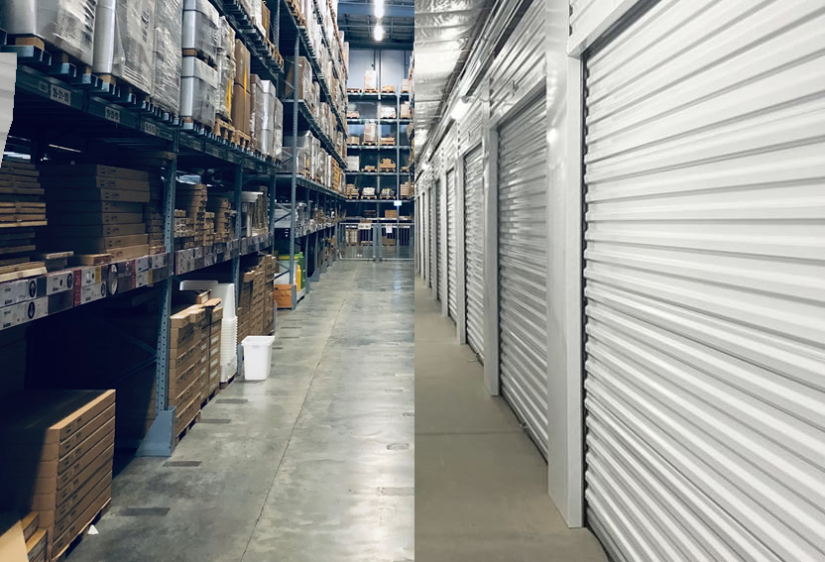Using Warehouses vs. Storage Units for Business Storage
When you're managing your company's inventory, tools, and paperwork, having a proper storage solution is essential. Warehouses and storage units are two common choices, each with upsides and downsides based on your company's needs. In this blog post, we'll go over the main distinctions between warehouses and storage units so you can decide which option is right for you.
1. Size and Capacity
Storage Units: Storage units can also be as tiny as lockers or measure lengths of up to 40 feet or more. For companies who need to keep paperwork, office supplies, seasonal goods, or lesser quantities of inventory, these units are perfect. Businesses can select the exact amount of space they need without overcommitting to a larger space that they can't fill.
Warehouses: Typically measuring thousands of square feet, warehouses offer much more space for storage. Because of this, they're a great choice for companies that have to store large volumes of merchandise, big pieces of equipment, or a lot of office furniture. Warehouses are best for companies with large storage requirements and can hold a greater volume of products.
2. Cost Efficiency
Storage Units: For organizations with moderate storage needs, storage units are typically more affordable. Businesses can rent only as much space as they need, and the rental costs are less than those of warehouses. Also, many storage facilities (including Lockaway Storage) have flexible month-to-month leases, which free up businesses to scale up or down without committing to a long-term lease.
Warehouses: Although they offer more space, warehouses often have higher costs for maintenance, utility, and rent. Warehouses may ask for longer leases, which can make them less adaptable for businesses with changing storage needs. However, the cost per square foot in a warehouse may be more affordable for companies that need large-scale storage.
3. Convenience and Accessibility
Storage Units: Businesses that need to retrieve items after regular business hours can benefit from the convenient access hours that most storage facilities offer, which often extend into the evening and on weekends. Many facilities have climate controlled storage units, which are great for delicate goods like documents, electronics, and other kinds of inventory. Also, since storage facilities are often conveniently located near city centers and residential areas, small businesses can easily access them.
Warehouses: If a warehouse is located in a bigger industrial complex, its access hours may be more restricted. However, these warehouses frequently have heavy-duty machinery and loading docks, which can improve the efficiency of managing big shipments. Warehouses might be better for companies that need to send and receive huge amounts of goods on a regular basis.
4. Safety Aspects
Storage Units: Gated entry, security cameras, and on-site supervision are just a few of the high-security features that modern self storage facilities have to offer. If you're storing expensive items or confidential documents, these security features help ensure your peace of mind.
Warehouses: Warehouses also often security measures, although the degree of protection varies depending on the individual facility. While some warehouses might offer complete security systems, others might need their renters to make their own investments in extra security precautions. Before you commit to renting a warehouse for storage, contact them and make sure they have the security features you need.
5. Adaptability and Personalization
Storage Units: Although often less configurable, storage units provide a range of sizes and lease options. It's easy for businesses to increase or decrease the size of their units in response to shifting needs, and month-to-month leases mean it's always easy to downsize.
Warehouses: Warehouses can be tailored in many ways. Renters can add specialized shelving, racking systems, and even office spaces. (Although many storage facilities also offer office spaces for rent.) Putting these adaptations into practice can be expensive and frequently calls for a long-term commitment. But if you need a more customized storage solution in a larger space, warehouses are a great solution.
6. Appropriateness for Various Business Types
Storage Units: Perfect for startups, small to medium-sized enterprises, and businesses with varying storage requirements. Businesses who need to store inventory, office supplies, seasonal goods, or data but can't commit to large-scale storage will find storage units to be a good fit.
Warehouses: Ideal for manufacturing firms, larger businesses, corporate entities, and those with substantial storage needs. Additionally, warehouses are perfect for companies who need to keep a lot of merchandise, big machinery, or a lot of shipping and receiving.
The size of your business, the quantity and size of what you need to store, your budget, and how frequently you need to access your things are all important considerations when deciding between storage units and warehouses. Storage units provide a versatile, affordable alternative for small businesses or those with changing storage needs. However, a warehouse can be a better choice if your company needs frequent shipment and large-scale storage. You can choose the option that will best support the operations and expansion of your organization by taking these considerations into account.


